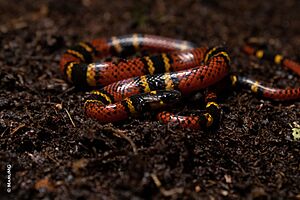Pliocercus elapoides facts for kids
Quick facts for kids Pliocercus elapoides |
|
|---|---|
 |
|
| The variegated false coral snake | |
| Conservation status | |
| Scientific classification | |
| Genus: |
Pliocercus
|
| Species: |
elapoides
|
| Synonyms | |
|
|
The variegated false coral snake, also known by its scientific name Pliocercus elapoides, is a type of snake. It belongs to the family called Colubridae. This snake is special because it looks a lot like a venomous coral snake, but it is not dangerous to humans. It lives in southern North America and northern Central America. There are four different kinds, or subspecies, of this snake.
Contents
Where the Snake Lives
The variegated false coral snake makes its home in several countries. You can find it in Belize, El Salvador, Guatemala, and Honduras. It also lives in the southeastern part of Mexico.
Its Forest Home
This snake loves to live in forests. Forests are its favorite natural habitat. It finds everything it needs to survive there.
What the Snake Looks Like
This snake is known for its bright colors. It has a pattern of red, black, and yellow rings all over its back. The red scales on its body have black tips. This color pattern helps it look like a venomous coral snake. This is a clever way to scare away predators.
How the Snake Behaves
The variegated false coral snake is a night animal. This means it is most active when the sun goes down. It moves around on the ground, so it is called terrestrial. It also spends some time digging and moving through the soil. This is known as being semi-fossorial.
Life Cycle: How it Reproduces
The variegated false coral snake lays eggs. This way of reproducing is called oviparous. The mother snake lays her eggs, and then the baby snakes hatch from them.
Different Kinds of Variegated False Coral Snakes
There are four recognized types, or subspecies, of the variegated false coral snake. Each one is a bit different but still belongs to the same species.
- Pliocercus elapoides aequalis Salvin, 1861
- Pliocercus elapoides diastema (Bocourt, 1886)
- Pliocercus elapoides elapoides Cope, 1860
- Pliocercus elapoides occidentalis H.M. Smith & Landy, 1965
When you see a name like (Bocourt, 1886) in parentheses, it means that this subspecies was first described under a different scientific group. Later, scientists moved it to the Pliocercus group.


